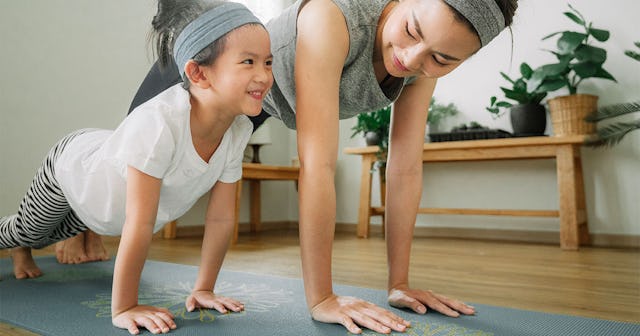My Call To More Conscious Parenting

Confession: I had no idea what I was in for as a parent when I became pregnant with my daughter. I was 26 years old and the first of my friends to have a baby. I remember day dreaming at my then-office of the days I’d be on maternity leave—how the baby would be sleeping peacefully in a carrier and I’d hang out at a coffee shop, reading a book and sipping a latte.
It’s cute how naïve I was. Or so I like to tell myself.
The truth couldn’t have been any more different. My daughter was born nine weeks early and we spent the days I’d imagined as my coffee-shop days in the NICU. When we took her home, she wouldn’t nurse. She would take hours to finish one bottle. She wouldn’t sleep. She fussed. She had reflux and developmental delays and a handful of infant medical woes that kept me up at night. And then my son was born.
Since then I’ve just been in “go” mode as a parent. When my kids were babies, it was just survival: what needed to be done and when in order to keep them alive and maybe to squeeze in a shower for me. Then, as they got older, I patchworked my parenting style together based on tips and tricks I learned from family members and mom friends I’d made. Then my husband was diagnosed with terminal brain cancer, and he died, and the children were (will always be) grieving, and I again fell into survival mode.
And in all that time, I’d read about helicopter parents and free-range parents, but I never stopped to think what kind of parent I wanted to be—not in a conscious way. I’ve been simply doing, and it’s been enough. Until recently.
Westend61/Getty
Now my kids are older. They aren’t babies and the grief isn’t as raw as it once was, so we aren’t in survival mode. They’re facing all the usual big kid issues—changing friendships and learning how to carve out independence from their mother. And also growing up against the backdrop of a deadly pandemic and a national movement to end racial injustice. And lately, simply resorting to that old patchwork system of parenting doesn’t feel like enough.
Lately, it feels like we—the kids and I—are floundering, and I suspect that’s because my parenting is all over the place. We have limits on screen time, unless I’m busy with deadlines or stressed and then screen time limits are out the window because we’re all doing our best. They should go out and play outside, run and ride bikes, but not too fast and stay where I can see them. I want them to be themselves around their friends and not be afraid to go against the crowd, but also, learn to be flexible, because that’s important, too.
In an effort to stop floundering, and maybe begin to parent from a place that’s less piecemeal and more stable, I looked into the different styles of parenting. Maybe what I needed was to begin parenting from a more conscious place, with a more defined approach.
I learned there are three classic styles of parenting as identified by a psychologist in the 1960s. They are: authoritarian, authoritative, and permissive. Modern day parenting has taken those three styles and further refined them, while also giving them trendy names like helicoptering or free-ranging or attachment parenting.
Hello Africa/Getty
The problem I found was that after a decade of patchwork parenting, I couldn’t quite find a style that felt right. A helicopter parent wouldn’t work for me. As a solo parent building two careers at once, I know I cannot hover over my kids and I need them to foster a whole lot of independence. Likewise, a free-range approach wouldn’t work for me, because I have an anxious personality and a good imagination and the combination means I can, within the space of two heartbeats, picture every single thing that could ever go wrong. I like my personal physical space too much for attachment parenting, but I’m not strict enough to be authoritarian.
When I came across the term “gentle parenting” I found something that felt like a better fit. The core of gentle parenting is in developing the relationship between the parent and the child, fostering a dialogue about a range of feelings, choices, and needs. I’m all in on this style. After uttering the words “brain cancer” and “hospice” to my children, we’ve gotten good at honest communication, talking about anything and everything. And yet, sometimes I have been known to throw out a “because I said so” when it comes to why my kids should make their beds, rather than discussing how important it is to take care of and take pride in your space.
Maybe the truth is that there’s nothing wrong with patchworking together a parenting technique. Maybe the truth is that to stop the floundering, what I need isn’t a defined style, but a more intentional approach to my personal parenting style. Rather than patchworking my parenting together because I’m in “go” mode, maybe I can patchwork my parenting together because I’ve stopped and considered what is best for my children and me. Maybe approaching parenting, whatever style in whatever moment, with more intentionality will provide the stability and consciousness we (my children and I) all need to stop floundering, to feel like enough.
This article was originally published on